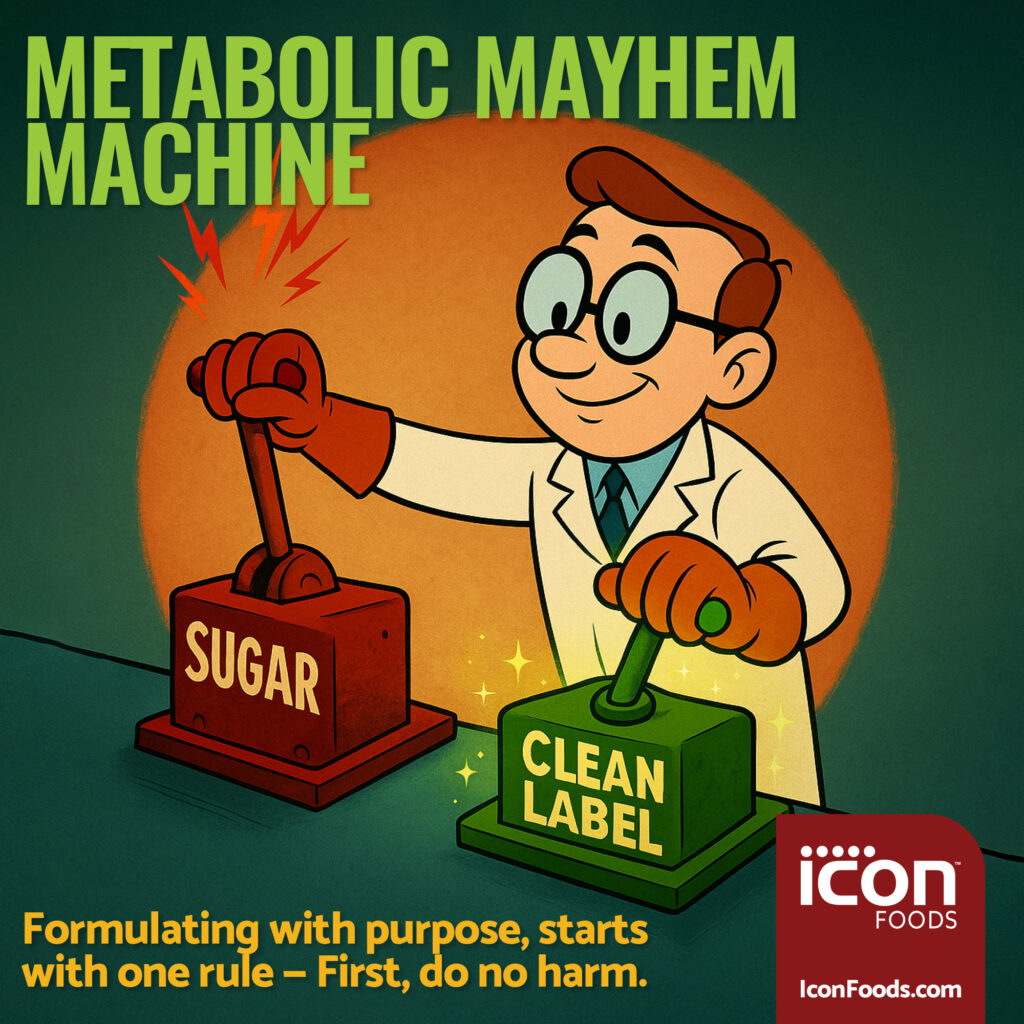Summary
In today’s better-for-you landscape, sugar reduction isn’t just a formulation challenge—it’s an ethical one. As consumers demand transparency, functionality, and clean-label integrity, food scientists are being called to balance sweetness with science, and innovation with responsibility. In this article, we explore why principles like “the dose makes the poison” and “first, do no harm” are shaping the future of product development, and how clean-label sweetening systems rooted in metabolic health, digestive tolerance, and honesty can help brands create foods that nourish without compromise. This is more than reformulation—it’s reformation.
Authored by:
Thom King, Icon Foods
Chief Innovations Officer/Certified Food Scientist
We’re living in a time when consumers read ingredient decks like love letters, or breakup notes, depending on what they find. The better-for-you food revolution isn’t just a passing trend; it’s a full-blown movement toward transparency, functionality, and ethics in every bite. And at the center of this clean-label crusade? Sugar reduction.
Let’s face it, sugar has been both hero and villain in our collective food story. A little gives you energy and flavor; too much, and you’re on the express train to metabolic mayhem. That’s where science meets ethics, and where principles like “the dose makes the poison” and “first, do no harm” take center stage in the food industry’s effort to do right by the people we feed.
The Dose Makes the Poison
Paracelsus, the OG toxicologist, famously said, “The dose makes the poison.” Translation: even water can kill you if you drink a swimming pool worth. Sugar is no different. It’s not evil, it’s just been overdosed into nearly every packaged product in America.
But in practice, dose interacts with biology in complex ways:
- Glycemic impact isn’t linear—small amounts may be neutral, but larger loads can drive spikes that affect insulin sensitivity over time.
- Repeated exposures compound metabolic stress, especially when sugars are consumed without fiber, fat, or protein.
- Liver processing has thresholds; once glycogen stores fill, overflow is converted to fat via de novo lipogenesis.
So dose matters—but so does context.
When it comes to health, moderation isn’t sexy marketing copy, but it’s solid science. Clean-label formulators, the kind who care about what goes into your body, are dialing in the dose and swapping out the junk for nature’s cleaner tools. Natural high intensity sweeteners like stevia and monk fruit, or rare sugars like allulose, are proving that sweetness doesn’t have to come with a metabolic penalty.
At Icon Foods, we live by that balance. We know that sweetness can exist in harmony with wellness when you apply a little food science and a lot of integrity. Because in the end, it’s not about vilifying sugar, it’s about right-sizing it and choosing better inputs that don’t send your blood sugar (or your conscience) on a rollercoaster.
First, Do No Harm
That old medical oath, “First, do no harm”, might sound more at home in a hospital than a food plant, but it belongs here too. Every formulation is a moral decision. When you choose to cut sugar, the next question is what do you replace it with?
A lot of brands take shortcuts: cheap synthetics, mystery “flavors,” or artificial sweeteners that may check the calorie box but don’t do consumers any favors long term. Clean-label sugar reduction demands more, it’s about designing sweetness systems that are kind to the gut, friendly to the glycemic index, and clear on the label. No smoke, no mirrors, just science that serves both body and planet.
At Icon Foods, that’s our north star, to innovate without harm. We test, verify, and validate so that every sweetener, fiber, or modulator that leaves our facility can stand up to scrutiny, yours, the FDA’s, or your grandmother’s.
The better-for-you movement demands more. It’s about designing sweetness architectures that are:
- Gut-friendly
- Glycemic-friendly
- Digestively neutral or beneficial
- Supported by clinical evidence
- Free from off-notes and off-effects
- Aligned with consumer expectations for transparency
For example, fibers like PHGG (FibRefine HG), inulin, and soluble tapioca fiber have demonstrated prebiotic and metabolic support. Rare sugars like allulose have been shown to positively modulate postprandial glucose. These aren’t just ingredients—they’re ethical tools.
At Icon Foods, that’s our north star: to innovate without harm. We test, verify, and validate so every sweetener, fiber, or modulator that leaves our facility can stand up to scrutiny—yours, the FDA’s, or your grandmother’s.
Clean-label sugar reduction isn’t just reformulation, it’s reformation. It’s proof that doing the right thing for human health doesn’t have to taste like compromise. And if we, as formulators and food scientists, keep our “why” front and center, to nourish, not just sell, then maybe, just maybe, we can engineer a sweeter future that’s good for both people and planet.
Samples!
x